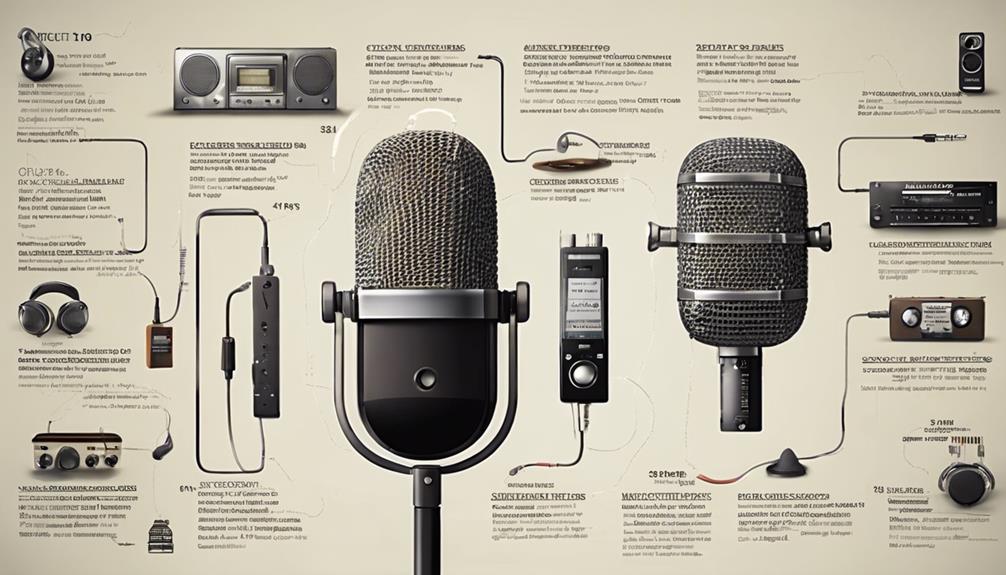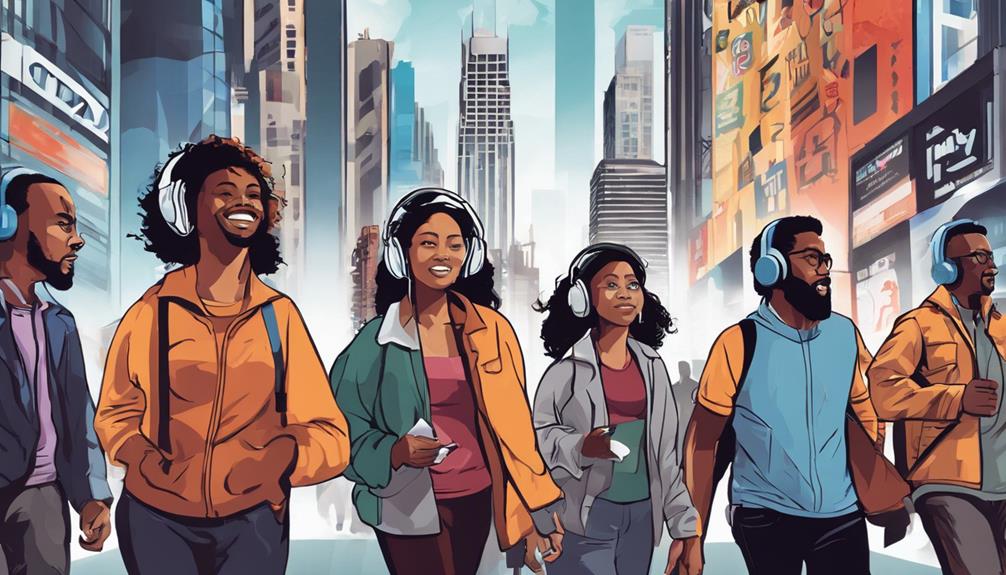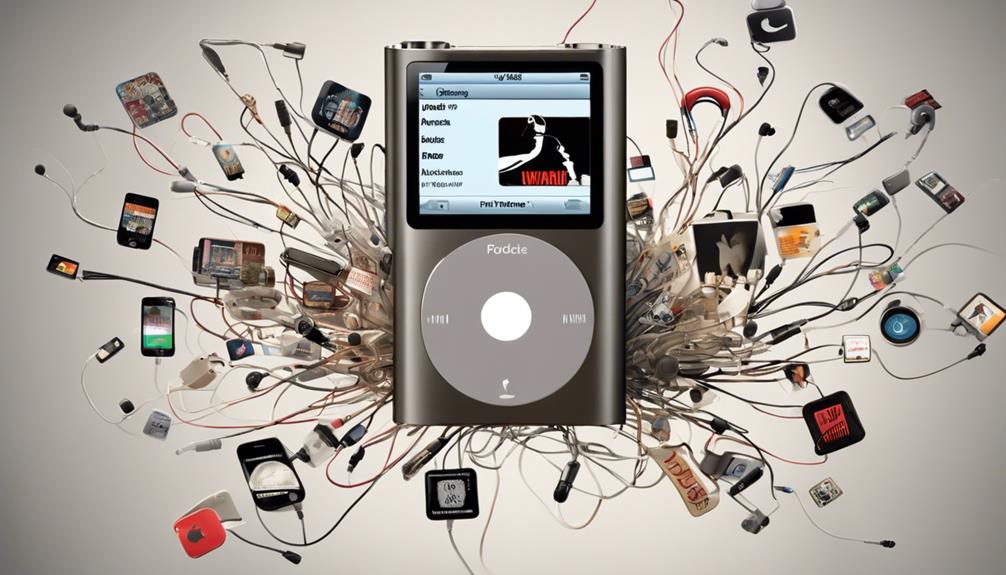The podcasting boom became popular in the early 2000s. Key developments like the integration of RSS enclosures and Apple's backing of podcasts in iTunes propelled its rise. These milestones revolutionized how audio content was created, shared, and enjoyed, setting the stage for the podcasting phenomenon we witness today. The introduction of on-demand radio shows and the support from major platforms like Apple further fueled its growth. These pivotal moments marked the beginning of a new era in digital media consumption. Discover more about the fascinating evolution and impact of podcasting from its inception to its current prominence.
Key Takeaways
- Emerged in early 2000s with RSS enclosures.
- Apple's iTunes integration in 2005 boosted visibility.
- True crime podcast 'Serial' in 2014 sparked interest.
- President Obama's appearance in 2015 solidified mainstream status.
- Significant growth in active podcasts since 2008.
Origins of Podcasting
Frequently overlooked in the history of media, podcasting emerged in the early 2000s as a revolutionary form of content delivery. With the introduction of RSS enclosures in 2001, the groundwork was laid for automatic downloading of audio files, paving the way for the podcasting revolution. It wasn't until 2004, when journalist Ben Hammersley coined the term 'podcasting,' that this innovative method of distributing digital audio content truly started to gain recognition.
Apple played a pivotal role in propelling podcasting into the mainstream medium it's today. In 2005, Apple integrated podcast support into iTunes, making it easier for users to discover and subscribe to podcasts. This move notably increased the visibility of podcasts and attracted a broader audience to this new form of media consumption.
Evolution of Podcasting Technology

The evolution of podcasting technology has been marked by significant advancements in on-demand audio delivery and user experience enhancements. From the introduction of RSS enclosures enabling automatic downloads to the integration of video content, podcasting has continually evolved to offer a more immersive experience for listeners. Podcasting clients like Apple Podcasts and Spotify have played a pivotal role in enhancing user accessibility to a vast array of audio content. Technological progress has also led to personalized recommendations, seamless ad insertion, and innovative features that elevate the podcasting experience.
| Advancements in Podcasting Technology | Examples |
|---|---|
| RSS Enclosures | Automatic downloading of audio files |
| On-Demand Radio Shows | Shaping the evolution of podcasting |
| Podcasting Clients | Apple Podcasts and Spotify enhancing user experience |
These developments have not only expanded the reach of podcasts but have also paved the way for a more dynamic and engaging audio content landscape.
Mainstream Recognition of Podcasting

Podcasting's mainstream recognition accelerated following Apple's integration of podcasts into iTunes in 2005. This move opened the floodgates for podcasters to reach a wider audience, marking a pivotal moment in the medium's history. The term 'podcasting' was even crowned Word of the Year by the New Oxford American Dictionary that same year, showcasing its rapid ascent into popular culture.
In 2014, the true crime podcast Serial took the world by storm, becoming a cultural phenomenon and capturing the attention of millions. This gripping series not only entertained but also sparked a newfound fascination with podcasts, drawing in listeners from all walks of life.
President Barack Obama's appearance on 'WTF with Marc Maron' in 2015 further solidified podcasts as a mainstream platform. By 2016, podcasts like 'Serial' and 'The Joe Rogan Experience' had amassed massive followings, firmly establishing podcasting in the domain of mainstream media. The true crime genre, in particular, played a significant role in propelling podcasts into the spotlight, paving the way for diverse content to thrive in this dynamic landscape.
Impact of RSS Enclosures

Utilizing RSS enclosures revolutionized the distribution of audio content, transforming how podcasts are consumed and shared. This technology allowed for the automatic download of audio files, making it easier for users to subscribe to podcasts and receive new episodes directly on their devices.
As a result, podcast consumption became more convenient and accessible, driving the growth of the medium. Podcasters leveraged RSS enclosures to reach a broader audience and establish loyal listener bases, leading to the popularization of podcasting as a mainstream form of media consumption.
The introduction of RSS enclosures played a pivotal role in shaping the landscape of content distribution, enabling seamless access to a wide range of audio content. Through this innovative technology, podcasts have become an integral part of modern media consumption habits, offering a diverse array of content to listeners worldwide.
RSS enclosures have truly revolutionized the way we consume and share podcasts, contributing significantly to the medium's widespread adoption and success.
Role of Apple's Itunes Platform

Apple's iTunes platform revolutionized podcast consumption by offering a convenient way to access and listen to a wide range of shows. With the introduction of the Podcasts app in 2012, Apple made it easier for users to discover and subscribe to podcasts, contributing to the medium's widespread popularity.
Podcasters found a valuable distribution channel in iTunes, benefiting from increased visibility and audience engagement.
Apple's Itunes Influence
The integration of podcasts into the iTunes platform in 2005 revolutionized the way users discovered and consumed audio content. iTunes played a pivotal role in boosting podcast consumption and production, leading to a surge in podcast listenership. The platform's accessibility made it effortless for users to explore and enjoy a wide range of podcasts, propelling many shows to new heights of popularity. Below is a table highlighting the key points of Apple's iTunes influence in the podcasting landscape:
| iTunes Influence | Details |
|---|---|
| Enhanced Podcast Discovery | Easy access to a variety of podcasts |
| Increased Listener Engagement | Convenient subscription and download options |
| Boosted Content Creation | Encouraged the development of diverse podcast offerings |
| Amplified Podcast Reach | Helped popular shows gain widespread audience exposure |
| Streamlined User Experience | Simplified the process of finding and enjoying podcasts |
Apple's iTunes platform truly reshaped the podcasting industry, fostering innovation and expanding the reach of audio content.
Podcasting Platform Dominance
Playing a pivotal role in the podcasting landscape, iTunes revolutionized how audio content was discovered and consumed. Apple's iTunes platform became a powerhouse for podcast discovery, offering subscription features that made podcasts widely accessible.
This centralized platform not only expanded the audience reach but also boosted engagement with podcasters. By providing a user-friendly interface and hosting capabilities, iTunes greatly contributed to the growth of podcasting as a mainstream medium.
Podcasters benefited from increased visibility and promotion through iTunes, further solidifying its dominance in the podcasting platform arena. The seamless integration of hosting, distribution, and promotion on iTunes made it a go-to platform for both creators and listeners, shaping the podcasting industry as it stands today.
Global Expansion of Podcasting

The growth of podcasting worldwide is undeniable, with the market expected to reach USD 89.64 billion by 2028, showcasing its monumental impact.
Podcasts not only entertain but also play a significant role in shaping cultural conversations globally.
With diverse audiences tuning in, podcasts have become a powerful medium for sharing stories, knowledge, and perspectives across borders.
Podcasting Growth Worldwide
With podcasting's global market value projected to skyrocket to USD 89.64 Billion by 2028, its widespread adoption and impact on various industries are undeniable. The versatility of audio files has enabled a vast range of content, attracting a growing number of podcast listeners globally. This expansion has created significant monetization opportunities, prompting increased competition among industry giants like Apple, Amazon, and Spotify.
As the podcasting market evolves with new content formats and innovative strategies, the industry continues to flourish. Academic institutions are also leveraging podcasts as a tool for distributing educational materials, further contributing to the medium's growth. The positive outlook for podcasting signals continued growth in both listenership and revenue, solidifying its global influence and market trends.
Cultural Impact of Podcasts
Embracing diverse cultural influences, the global expansion of podcasting has revolutionized content creation and audience engagement.
With podcasts in various languages and dialects, traditional customs and modern trends blend seamlessly, offering listeners a diverse range of shows to explore. Different countries contribute their unique perspectives, enriching the podcasting landscape and catering to multicultural audiences worldwide.
Global platforms facilitate creators in reaching international listeners, transcending borders and fostering inclusivity.
This expansion hasn't only connected people globally but also promoted cultural exchange and understanding on a scale previously unseen. The impact of podcasts extends far beyond entertainment, sparking meaningful conversations and creating a sense of unity among listeners worldwide.
Diverse Podcasting Audiences
Exploring the vast array of podcast audiences worldwide reveals a rich tapestry of cultural preferences and interests. The global expansion of podcasting has connected communities around the world, transcending borders and traditional radio limitations.
Podcasts cover a wide range of topics, catering to the diverse tastes of a truly international audience. These audio shows investigate various languages, local issues, and global trends, reflecting the cultural diversity of our interconnected world.
Factors Contributing to Podcasting Boom

The enhanced accessibility of technology has greatly contributed to the podcasting boom. Podcasting's growth as a powerful content marketing tool since its inception in 2003 is undeniable. The ability for individuals to control their platforms and narratives independently has revolutionized the sharing of untold stories. In the table below, we highlight key factors driving the podcasting boom:
| Factors | Description | Impact |
|---|---|---|
| Technology Accessibility | Increased access to smartphones and other portable media devices | Facilitates on-the-go listening |
| Independent Content | Freedom from traditional media gatekeepers, allowing for diverse and unfiltered content creation | Fosters creativity and authenticity |
| Growth of Podcasting | Surge in active podcasts since 2008 | Indicates industry expansion |
| Portable Media | Podcasts can be accessed anytime, anywhere | Enhances convenience for listeners |
| Untold Stories | Platform for sharing diverse narratives that were previously overlooked | Promotes inclusivity and diversity |
Frequently Asked Questions
When Did Podcasting Start Gaining Popularity?
Podcasting started gaining popularity in the mid-2000s, fueled by the release of Apple's iTunes 4.9 with podcast support. Major media outlets like BBC, NPR, and CNN began offering podcasts in 2005, further boosting its appeal.
The number of podcast subscriptions on iTunes surpassed 1 million that same year, indicating a growing listener base. The rise of portable media players and increased internet connectivity contributed to the rapid rise of podcasting.
When Was the Podcast Boom?
The podcast boom hit its peak around the mid-2000s, with significant growth in shows and listeners. One standout year was 2008, where the number of active podcasts surged, showcasing the medium's power and potential.
This period marked a turning point in podcast popularity, setting the stage for its continued rise as a preferred form of content consumption. The landscape of podcasting was forever changed as it became more accessible and widely embraced.
When Did People Start Listening to Podcasts?
We started listening to podcasts around the mid-2000s. The rise of the iPod and the term 'podcast' helped boost the medium's popularity. By 2005, Apple integrated podcast support into iTunes, making it easier for users to find and enjoy podcasts.
The convenience of on-demand audio and the diverse range of genres drew more listeners over time. Today, podcasts have become a mainstream form of entertainment and education.
Why Are Podcasts Suddenly so Popular?
Podcasts are suddenly so popular because they offer a diverse range of topics tailored to individual interests.
The on-demand nature of podcasts allows us to consume content whenever and wherever we want, enhancing our listening experience.
The accessibility of podcasts on smartphones and smart speakers has revolutionized how we engage with audio content, making it a convenient and enriching pastime.
The boom in podcasting reflects our desire for personalized, on-the-go entertainment.
Conclusion
To sum up, the podcasting boom has been fueled by a combination of technological advancements, mainstream recognition, and global expansion.
For instance, the true crime podcast 'Serial' became a cultural phenomenon, drawing millions of listeners and sparking conversations worldwide.
As podcasting continues to evolve and reach new audiences, it's clear that this medium has established itself as a powerful platform for storytelling and information sharing.










